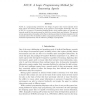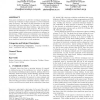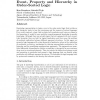1638 search results - page 80 / 328 » A General Semantics for Evaluation Logic |
CORR
2004
Springer
14 years 11 months ago
2004
Springer
FLUX is a programming method for the design of agents that reason logically about their actions and sensor information in the presence of incomplete knowledge. The core of FLUX is...
112
click to vote
PPDP
2004
Springer
15 years 5 months ago
2004
Springer
Semi-naive evaluation is an effective technique employed in bottom-up evaluation of logic programs to avoid redundant joins of answers. The impact of this technique on top-down e...
128
Voted
CVPR
2011
IEEE
14 years 8 months ago
2011
IEEE
We present a framework for the automatic recognition of complex multi-agent events in settings where structure is imposed by rules that agents must follow while performing activit...
IIE
2008
14 years 11 months ago
2008
Mathematical logic is a discipline used in sciences and humanities with different point of view. Although in tertiary level computer science education it has a solid place, it does...
ICLP
1999
Springer
15 years 4 months ago
1999
Springer
Knowledge representation in logics, even in the order-sorted logic that includes a sort hierarchy, tends to lose the conciseness and the nuances of natural language. If we could c...



